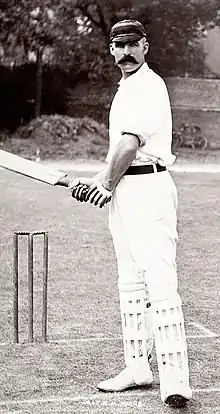Robert Poore
Robert Montagu Poore CIE DSO (20 March 1866 – 14 July 1938) was a cricketer and British army officer who, whilst serving in South Africa in 1896, played in three Test matches for the South African cricket team. Much of his cricket was played when he held the rank of major, but he eventually became a brigadier-general. "Of all the people in the history of the game," wrote Leo Cooper in an introduction to A. A. Thomson's Odd Men In, "he seems to stand for the Eccentric Ideal."[1]
 Poore pictured in about 1908 | ||||||||||||||||||||||||||||||||||||||||
| Personal information | ||||||||||||||||||||||||||||||||||||||||
|---|---|---|---|---|---|---|---|---|---|---|---|---|---|---|---|---|---|---|---|---|---|---|---|---|---|---|---|---|---|---|---|---|---|---|---|---|---|---|---|---|
| Born | 20 March 1866 Dublin, Ireland | |||||||||||||||||||||||||||||||||||||||
| Died | 14 July 1938 (aged 72) Boscombe, Bournemouth, England | |||||||||||||||||||||||||||||||||||||||
| Batting | Right-handed | |||||||||||||||||||||||||||||||||||||||
| International information | ||||||||||||||||||||||||||||||||||||||||
| National side | ||||||||||||||||||||||||||||||||||||||||
| Test debut | 13 February 1896 v England | |||||||||||||||||||||||||||||||||||||||
| Last Test | 21 March 1896 v England | |||||||||||||||||||||||||||||||||||||||
| Career statistics | ||||||||||||||||||||||||||||||||||||||||
| ||||||||||||||||||||||||||||||||||||||||
Source: Cricinfo, 13 November 2022 | ||||||||||||||||||||||||||||||||||||||||
Military career
Poore was the son of Major Robert Poore (1834–1918) and his wife Juliana Lowry-Corry, daughter of Rear-Admiral Armar Lowry-Corry.
He joined the 7th Hussars and served in the Second Matabele War in Rhodesia 1896–1897. He was appointed provost marshal in South Africa during the Second Boer War 1899–1902, and received the Distinguished Service Order (DSO) in 1901. In a despatch dated 31 March 1900, the commander-in-chief, Lord Roberts, described how Poore "has exercised his responsible duties, whether as regards the care of prisoners, or in maintaining order in camp and on the line of march, in a most satisfactory manner".[2]
Poore was provost marshal during the trial and execution of Breaker Morant and Peter Handcock, and his diary includes contemporary notes on their case.[3]
Cricket career
In 1899, Poore became the most fertile run-scorer in all of England, hitting 1,399 runs (including seven hundreds) between 12 June and 12 August at an average of 116.58. Against Somerset he made 304 and with fellow Army officer Captain Wynyard shared in a stand of over 400 for the sixth wicket – still the highest for that wicket in county cricket.[4] In 21 innings over the course of the entire season, Poore managed 1,551 runs at 91.23, a record average for an English season not broken until Don Bradman averaged 98.66 in 1930. Poore was rewarded with selection as a Wisden Cricketer of the Year.[5]
Poore returned to South Africa after the 1899 season to fight in the Boer War. After he returned to England, a broken arm caused him to miss most of the 1902 season, but he showed he retained his former skill with a superb innings of 62 not out against Hugh Trumble on a sticky wicket for Hampshire against the touring Australians.[6] It was hoped Major Poore would be available again in 1903, but he went to India that summer and when he returned to Hampshire in the middle of 1904 to great expectations, his form was disappointing. Although there were few difficult pitches in the nine games he played, he averaged under twenty and only once (on a bad wicket against Sussex) did he show the skill that allowed him to dominate bowlers in 1899. In 1905 he again could not play at all, but he rejoined the team against Derbyshire in 1906 and in two matches scored 232 runs including 129 against Sussex, but another injury ended his season and as it turned out, his county career.
In spite of his impressive success, Poore was not yet overly enamoured with the game, which he had learnt not through classical coaching but the perusal of textbooks; certainly, it was not the only field in which his prodigious talents lay: he was a first-rate swordsman, shot and polo player, and once won the West of India lawn tennis championship. Not until, as a subaltern, he visited India with the 7th Hussars did he realise his love for cricket, a love that he sustained all through his life. Poore remained a dangerous batsman in club games right up to his mid-fifties, and played first-class cricket in India as late as 1913.
Family
In 1898 Poore married Lady Flora Mary Ida Douglas-Hamilton (1866–1957), daughter of Captain Charles-Douglas-Hamilton, and sister of the 13th Duke of Hamilton. The couple had no children. Three years after their marriage, Poore's sister Nina Mary Benita Poore (1878–1951), married her brother's brother-in-law, and became Duchess of Hamilton.
References
- Cooper introduction to Odd Men In, pp. v–vi.
- "No. 27282". The London Gazette. 8 February 1901. p. 844.
- "Diary sinks reputation of Breaker Morant". The Sydney Morning Herald. 21 August 2004. Retrieved 17 December 2018.
- Somerset v Hampshire 1899. Cricketarchive.com. Retrieved on 3 May 2018.
- Major Robert Poore. Espncricinfo.com. Retrieved on 3 May 2018.
- Hampshire v Australians 1902. Cricketarchive.com. Retrieved on 3 May 2018.
External links
 Media related to Robert Poore at Wikimedia Commons
Media related to Robert Poore at Wikimedia Commons- Robert Poore at ESPNcricinfo
- Thomson, AA: Odd Men In (The Pavilion Library, 1985).
- Profile
- . . Dublin: Alexander Thom and Son Ltd. 1923. p. – via Wikisource.